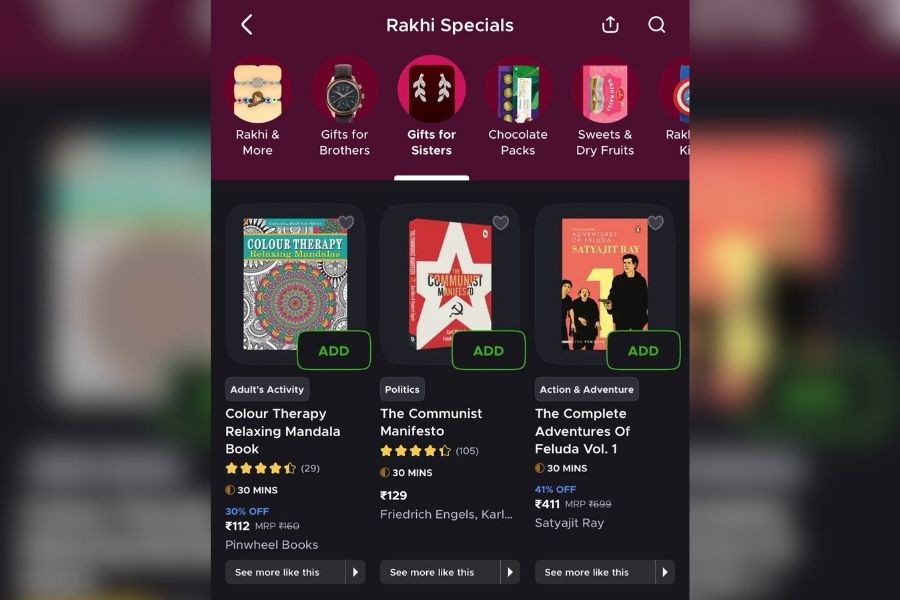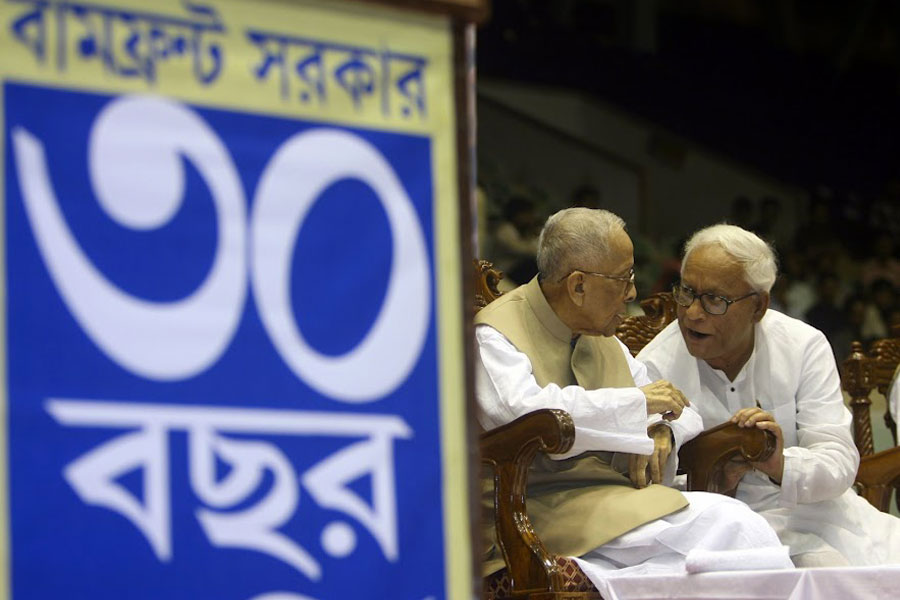One is a peak-capitalist labour-intensive platform. The other is a Hindu ritual that establishes males among siblings as the protector of the females. The third is a 177-year-old tome which called for the “workers of the world” to unite and predicted an equal platform for every person in the world while the edifice of Capitalism crumbled.
All three came together this Rakshabandhan – being observed across India on Saturday (August 9).
On Blinkit, the 12-year-old Gurugram-based Indian quick-commerce company that has changed the way the upwardly mobile Indian shops, the Communist Manifesto written by Karl Marx and Frederich Engels was clubbed alongside volume I of Satyajit Ray’s Feluda stories under the Rakhi special, “gifts for sisters” section, available at just Rs 129.
One can only imagine whether the thoughts of a delivery boy in Calcutta – as it was known while Marx was alive – in the 21st century, earning little over $7 a day, rushing through the chaotic traffic at breakneck speed, negotiating roadblocks to deliver the Communist Manifesto at the shortest possible time would have enraged Marx or left him bemused.
Looking at the delivery men rushing through with the parcel, Marx might have murmured, “The lowest and the only necessary wage rate is that providing for the subsistence of the worker for the duration of his work and as much more is necessary for him to support a family and for the race of labourers not to die out. The ordinary wage, according to Smith, is the lowest compatible with common humanity, that is, cattle-like existence.”
By Saturday, when Rakhi was being celebrated and the gifts had most likely been exchanged, the Communist Manifesto was still available on Blinkit, but not under the gift section, especially not for sisters, though the price remained unchanged and the delivery time to an office address in Kolkata’s Esplanade area was estimated at 16 minutes.

By Saturday, when Rakhi was being celebrated and the gifts had most likely been exchanged, the ‘Communist Manifesto’ was still available on Blinkit, but not under the gift section
The Communist Manifesto is also available on Amazon, the e-commerce site owned by American billionaire and the world’s third-richest person, Jeff Bezos.
Bezos’s site offers the Communist Manifesto slightly cheaper, at Rs 122, though there are heavier-priced options as well. The Kindle edition is even cheaper, just Rs. 24, and the audio book is free. The publishing house Penguin sells the book on Amazon as “original, unabridged classic” at Rs 101.
Since first printed in February 1848 at the office of the Workers’ Educational Association at 46, Liverpool Street in London, Marx and the Communist Manifesto have come a long way making it to hand-held devices, something unthinkable while Marx was alive.
The first publication was a mere 23-pages of German text in a dark green cover; about 1,000 copies.
Marx’s anathema towards big capital notwithstanding, the early editions of The Communist Manifesto – only 11 of which are known to have survived – have been auctioned twice.
First was in Paris, where it fetched $18,000 in 1979. The other one – an “insignificant looking” copy from the first edition’s second issue with the front cover missing – was sold at Sotheby’s in London where a British org, the Valmadonna Trust, bought the book for $39,811 nearly 40 years ago.
The total sales of the Manifesto are estimated to be above 500 million with translations in around 200 languages, including four Indian ones. It is claimed to be among the four-bestselling books of all time, though there is no such definitive list.

A still from 'Good Boy, Bad Boy'
In his introduction to the 2012 edition of The Communist Manifesto, British historian Eric Hobsbawm wrote: “It should also remind us that there was no strong correlation between the size and power of social-democratic and labour parties and the circulation of the Manifesto. Thus until 1905 the German Social-Democratic Party with its hundreds and thousands of members and millions of voters, published new editions of the Manifesto in print runs of not more than 2,000-3,000 copies.”
One could just agree with Hobsbawm’s comment in the same piece: Nobody would have predicted such a remarkable future for the Manifesto in the 1850s and early 1860s.
That leaves aside any future for the political thought of Communism.
A survey conducted by a Utah-based company in 2021 found The Communist Manifesto among the top 10 most assigned books in Ivy League institutions and the top-ranked public colleges in the US.
It was ranked as the top-fourth text assigned at public colleges and universities, and the seventh-most assigned at Ivy League institutions.
Meanwhile, In 2020, India’s gig work force was estimated at 7.7 million, making a contribution of $1 billion to the economy annually.
The number is likely to rise to 23.5 million in another four years, while the delivery persons remain overworked, underpaid, with no social security and with only a couple of yet-to-be implemented laws that could provide them a semblance of dignity, in conditions close to those over 177 years ago when Marx sat down to write the Manifesto.



